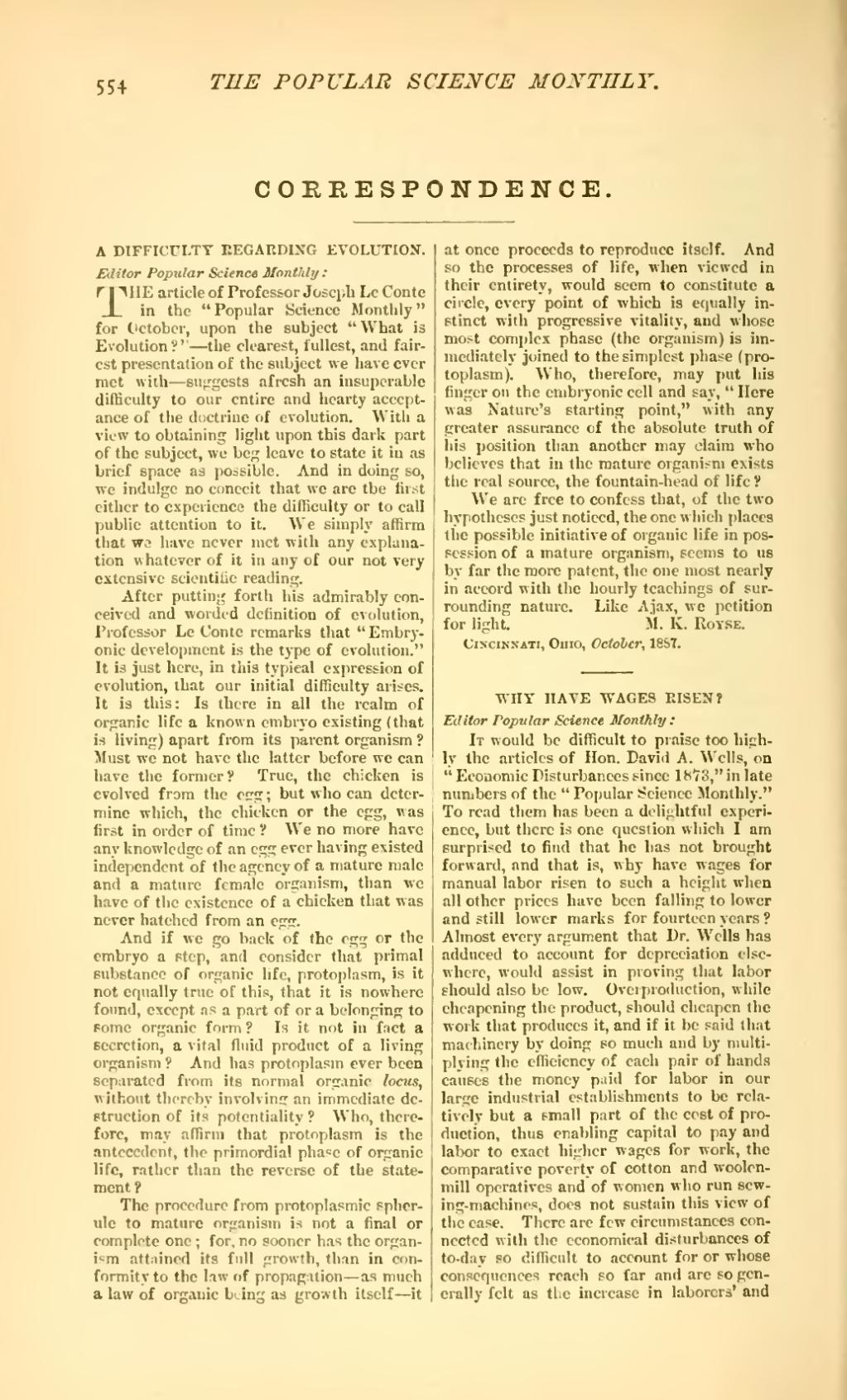A DIFFICULTY REGARDING EVOLUTION.
Editor Popular Science Monthly:
THE article of Professor Joseph Le Conte in the "Popular Science Monthly" for October, upon the subject What is Evolution?"—the clearest, fullest, and fairest presentation of the subject we have ever met with—suggests afresh an insuperable difficulty to our entire and hearty acceptance of the doctrine of evolution. With a view to obtaining light upon this dark part of the subject, we beg leave to state it in as brief space as possible. And in doing so, we indulge no conceit that we are the first either to experience the difficulty or to call public attention to it. We simply affirm that we have never met with any explanation whatever of it in any of our not very extensive scientific reading.
After putting forth his admirably conceived and worded definition of evolution, Professor Le Conte remarks that "Embryonic development is the type of evolution." It is just here, in this typical expression of evolution, that our initial difficulty arises. It is this: Is there in all the realm of organic life a known embryo existing (that is living) apart from its parent organism? Must we not have the latter before we can have the former? True, the chicken is evolved from the egg; but who can determine which, the chicken or the egg, was first in order of time? We no more have any knowledge of an egg ever having existed independent of the agency of a mature male and a mature female organism, than we have of the existence of a chicken that was never hatched from an egg.
And if we go back of the egg or the embryo a step, and consider that primal substance of organic life, protoplasm, is it not equally true of this, that it is nowhere found, except as a part of or a belonging to some organic form? Is it not in fact a secretion, a vital fluid product of a living organism? And has protoplasm ever been separated from its normal organic locus, without thereby involving an immediate destruction of its potentiality? Who, therefore, may affirm that protoplasm is the antecedent, the primordial phase of organic life, rather than the reverse of the statement?
The procedure from protoplasmic spherule to mature organism is not a final or complete one; for, no sooner has the organism attained its full growth, than in conformity to the law of propagation—as much a law of organic being as growth itself—it at once proceeds to reproduce itself. And so the processes of life, when viewed in their entirety, would seem to constitute a circle, every point of which is equally instinct with progressive vitality, and whose most complex phase (the organism) is immediately joined to the simplest phase (protoplasm). Who, therefore, may put his finger on the embryonic cell and say, "Here was Nature's starting point," with any greater assurance of the absolute truth of his position than another may claim who believes that in the mature organism exists the real source, the fountain-head of life?
We are free to confess that, of the two hypotheses just noticed, the one which places the possible initiative of organic life in possession of a mature organism, seems to us by far the more patent, the one most nearly in accord with the hourly teachings of surrounding nature. Like Ajax, we petition for light.
| M. K. Royse. |
| Cincinnati, Ohio, October, 1887. |
WHY HAVE WAGES RISEN?
Editor Popular Science Monthly:
It would be difficult to praise too highly the articles of Hon. David A. Wells, on "Economic Disturbances since 1873," in late numbers of the "Popular Science Monthly." To read them has been a delightful experience, but there is one question which I am surprised to find that he has not brought forward, and that is, why have wages for manual labor risen to such a height when all other prices have been falling to lower and still lower marks for fourteen years? Almost every argument that Dr. Wells has adduced to account for depreciation else-where, would assist in proving that labor should also be low. Overproduction, while cheapening the product, should cheapen the work that produces it, and if it be said that machinery by doing so much and by multiplying the efficiency of each pair of hands causes the money paid for labor in our large industrial establishments to be relatively but a small part of the cost of production, thus enabling capital to pay and labor to exact higher wages for work, the comparative poverty of cotton and woolen-mill operatives and of women who run sewing-machines, does not sustain this view of the case. There are few circumstances connected with the economical disturbances of to-day so difficult to account for or whose consequences reach so far and are so generally felt as the increase in laborers' and

